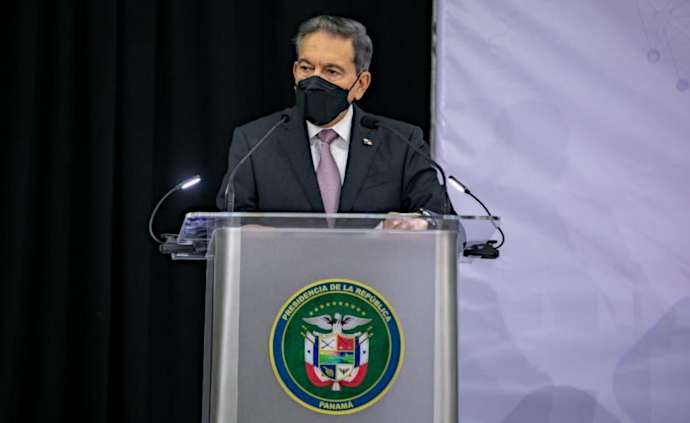President Cortizo played the safe token, offered plausible explanations and avoided a fight with his party’s legislative caucus. He can’t run again. History suggests that the PRD will step out of the presidency after the 2024 elections. This battle is about the personal aspirations of individual legislators. Photo by the Presidencia.
Symbolism, sleaze and shouting, but…
by Eric Jackson
On Wednesday, October 20, protesters were set to march against the National Assembly’s changes to National Electoral Reform Commission’s (CNRE’s) proposed modifications of the Electoral Code, as filtered by the three magistrates of the Electoral Tribunal and passed on to the legislature. There had been a public uproar when the assembly’s Government Committee began its changes of the changes, leading to a large demonstration in front of the Justo Arosemena Legislative Palace on September 14 and smaller rallies around the country.
The September 14 gathering was politically amorphous and largely anonymously called. In some of the rabiblanco media it was played up as something like the Civilistas 2.0, complete with the dress in white and 1980s anthems symbolism. But the good old boys from the upscale neighborhoods didn’t speak for the women who were incensed about the committee gutting the proposal to strengthen gender parity on the party tickets. Those who showed up to burn MOVIN placards for the benefit of Martinelista media cameras were stunt men who represented nothing very real, but then the upscale Independent Movement wasn’t real enough to guard its symbols from such abuse as the rally was breaking up.
The call centers and Twitter trolls swung into action, but the Electoral Tribunal magistrates walked out and the president stepped in to talk to various sides. Some egregious stuff like allowing a new Cambio Democratico convention for Yanibel Ábrego to replace Rómulo Roux as part leader and regulation of press coverage of and social media commentary about political figures as if it were paid advertising were removed from the legislation at that point.
However, after that interruption the deputies dug in their heels against gender parity and against any change to the downright weird quotient – half quotient – residue method of apportioning seats in multi-member legislative circuits. More demonstrations were called.
On October 20th the Civilista 2.0 crowd hardly showed up but the left was out in force, and talking about corruption and things economic more than about the election law itself. Perhaps an aversion to mixing with the sweaty working masses was just too much for the well heeled reformers, but actually it’s more than that. The neo-Civilista petition drive for a parallel constituent assembly needs 580,742 signatures by December 22 and they’ve been working on it for four months and have 16,981 signatures to show for it. Its proponents won’t say much about what they are for but the format of what they are trying to do is subject to the whims of the legislature and courts, which most Panamanians and the great majority of the protester do not trust.
So as the day’s protests approached, the president said that he would “partially veto” what the legislature had sent him. He didn’t immediately say what he would veto.
It turned out that he just vetoed one item, an amnesty from fines for those who in the 2019 election cycle had not filed the required financial disclosure statements. Protester types scoffed at the token. The Chamber of Commerce immediately said that it would sue, then backed down and said that their justice observation committee would look into it. The Electoral Tribunal had previously raised the prospect of a lawsuit over the constitutionality of the multi-member circuit deputies’ division, but they have remained silent about it since the veto.
The president sent back his line item veto, the legislature accepted that and jammed through the rest of what they had sent him.
So why did the Chamber backtrack? Why are the magistrates quiet?
It’s in part because a president can’t veto what is not sent to him, although there is the power to veto something whole unless what he wants gets put into the package. The very manipulable method of choosing who gets to be a deputy on the residue has been with us since the invasion. This time around, notwithstanding the magistrates’ and the CNRE’s insistence, the legislators left weak gender parity rules as they were. On the most electrifying issues, Nito’s veto doesn’t come into play.
However, is that system undemocratic, in that people get into the legislature when others with more votes in the same circuit don’t? The specifics are arcane, but the lead sentence in Article 2 of the Panamanian constitution provides that “Public Power emanates only from the people.” So is that a strong enough hook to topple a long-in-place part of the election law? Cambio Democratico leader Rómulo Roux, a corporate lawyer, says he will file a constitutional challenge over that point, although it’s hard to imagine that his brief won’t cite other authority. We may see the Chamber of Commerce and the election magistrates also file suits in similar veins.
However, for political purposes might it serve those who are annoyed by the current legislature to have things turn out as they are? “Residue” has become quite the toxic epithet, especially as some of those elected on that basis are so toxic. Ask most citizens about Jairo “Bolota” Salazar or Corina Cano, and they will have their followers but the general view will be dim. That the National Assembly is presided over by a residual deputy whose most noteworthy proposal of late was to lower the scores on the medical exams for doctors to get licensed to practice does not help. “Residuo” could be just the effective broad-brushed smear for an argument to wash away all of the incumbents.
In any case, as now written the rules will strengthen the established parties against new parties and independents. Which may do very little to hold off a bloodbath against incumbents in the next elections. We have seen some of those sorts of cycles before.
Indications that it may come to that are most evident by some PRD leaders jumping off the ship. Party secretary-general Pedro Miguel González is one of these. So is the head of the PRD women’s front, the xenophobic demagogue Zulay Rodríguez, who may not be PRD at all in the next elections. The Panameñistas and independents, the centrist new Otro Camino party and the leftist would-be Broad Front for Democracy (FAD) party that’s petitioning to get back on the ballot are all against what the legislature has done. Most of these folks may not DO anything, but at the moment it seems wise to SAY things to maintain a distance from an unpopular proposal.
On the PRD side the bet seems to be that all of this will be long forgotten by Election Day 2024.
Contact us by email at fund4thepanamanews@gmail.com
To fend off hackers, organized trolls and other online vandalism, our website comments feature is switched off. Instead, come to our Facebook page to join in the discussion.
These links are interactive — click on the boxes













